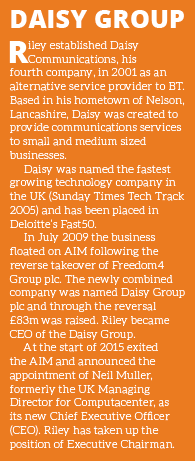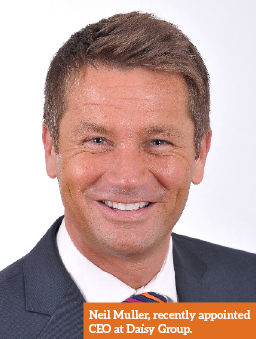
Editor Ian Hunter put pen to paper for his weekly reader newsletter following the recent takeover of Phoenix IT Group by Daisy and received a number of responses including from Daisy Chairman Matt Riley. Why not have your say on our LinkedIn Group pages.
The anticipated purchase of Phoenix IT Group by Daisy took place last month with the deal being heralded by Daisy founder and executive chairman Matthew Riley as making the firm the ‘first truly converged IT and unified communication provider in the UK mid-market’.
Depending on who you talk to this will be the 48th acquisition Riley has made since he started up in 2001, and the second this year following the acquisition of enterprise communication provider Damovo.
It will not be his last.
 Phoenix was in the middle of a three-year turnaround and had just about stemmed the losses but had not grown sales.
Phoenix was in the middle of a three-year turnaround and had just about stemmed the losses but had not grown sales.
It was reported elsewhere around the time of Daisy’s exit from AIM that Riley wanted to try to double the business in size over the next three to five years through a number of acquisitions and organic growth. The principal behind Neil Muller being appointed CEO coming in was to replicate his former employer Computacenter’s model but in the SME market.
Riley believes the small business supplier sector is ‘fragmented’ with no clear market leader and told The Register earlier this year, “We want to be the biggest player in that space, it’s quite fragmented… companies that have got to £40m, lifestyle businesses, that don’t get to a bigger scale.”
He may well be right but here’s four things for us lesser mortals in the channel to consider.
Damovo did not add any SME customers or skills to Daisy
Replicating the enterprise focussed Computercentre model in the SME market is not simple.
Phoenix IT adds even more enterprise, not SME, customers and skill sets.
Can you spot ANY Daisy channel partner involvement or opportunity in the above?
Me neither but that’s not the point and it is after all early days. Some would say however that the opportunity for resellers is fast becoming one of recognising that Daisy is predominantly now a direct sales operation and that the wholesale part of their business, albeit run by the enigmatic and innovative Terry O’Brien, is but a footnote on the sales top line.
Is the opportunity for resellers therefore to effectively compete with the newly engorged behemoth that has become Daisy by leveraging all the attributes that smaller, regionally based resellers have at their disposal – fast personal service and becoming the trusted advisor for the SME?
We all know that first and foremost people buy from people.
Would love to hear what you think.
In response to that request Daisy Executive Chairman Matt Riley wrote:
“It is great that Daisy is still supported by the magazine and that current acquisition activity is a focus for your editorial. I value the expression of your views and respect your opinion, however, in the name of healthy and open debate, I wanted to respond.
While Daisy is much changed from the business that I established in 2001, the channel and our partner community are pivotal to our growth and success. That is something that will never falter within what is now a much enlarged Group.
 For the last decade we have been intent on consolidating the fragmented reseller market and have been vocal about doing so – it is something we can never be accused of shying away from. So while the deals we complete may be bigger, and the businesses we serve more diverse, that original mantra has never changed.
For the last decade we have been intent on consolidating the fragmented reseller market and have been vocal about doing so – it is something we can never be accused of shying away from. So while the deals we complete may be bigger, and the businesses we serve more diverse, that original mantra has never changed.
Throughout our development it has been important that we continue to evolve in line with market dynamics and also alongside the specific needs of our customers in what we all know to be a rapidly changing marketplace. Convergence is here and it is here to stay. We evolve and our partners evolve.
So, for Daisy in 2015, that means delivering services to SMBs – organisations with between 10 and 500 employees - via our Wholesale, Distribution and direct business; to the mid-market – organisations with between 500 and 2,000 employees - via Daisy Corporate Services; and to enterprise customers (organisations with more than 2,000 employees) via larger IT resellers, service integrators and traditional carriers via our indirect Partner Services division.
So in response to the points you make:
Damovo did not add any SME customers or skills to Daisy? The acquisition added mid-market customers, skills and expertise into our business. Like a Microsoft gold accreditation, including consultants and engineers, which we now offer out to the channel under a white label banner.
Replicating the enterprise-focused Computacentre model in the SME market is not simple? I agree and nobody has done it…yet!!!!
Phoenix IT adds even more enterprise, not SME, customers and skill sets? The acquisition will give us mid-market customers – not SMB and not enterprise. It will also bolster our indirect Daisy Partner Services division, with 50% of the Phoenix revenue (over £100m) coming from white label services to partners such as ATOS, BT, KCOM, Computacenter, Cap Gemini plus hundreds of existing UK resellers. Phoenix is also an accredited Microsoft CSP (cloud solutions provider) meaning we can offer white label Microsoft 365 out to channel via a self- billing portal, letting channel partners own the entire billing process.
Can you spot ANY Daisy channel partner involvement or opportunity in the above? Yes we can - all of these services and products will be available to the channel, which has to be great news. You might also want to mention that we acquired the engineering and professional services division of Calyx this year and we are offering all their services as well (Christmas has come early to the channel!!!!)
We are still focussed on serving the business market and supporting all our customers in the converging marketplace.
And I have to agree that, first and foremost, people buy from people. That is why we have three of the channel’s biggest personalities at the helm of our three channel businesses. I am incredibly proud of the indirect model that Daisy operates, through Terry O’Brien in Wholesale, Dave McGinn in Distribution and Jason Spring in Partner Services.
All are demonstrating growth and that growth, aside from having some of the best people in the industry, is testament to an extended portfolio and expertise that has been made possible by our M&A activity. Expertise, buying scale, product breadth and innovation – coupled with our continued commitment to channel – means the deals we undertake will only ever add value for our partners.
And you’re right - depending on who you ask, you will get a varying response to the total number of acquisitions including Phoenix IT.
If you’re asking me, I can tell you this deal will be number 49.”
Ed Says…
It’s great that Matt Riley has personally become involved in the debate, and talking to others in the channel, it is a debate and one about issues that many organisations face as they rapidly grow and expand. All the things that local dealers and resellers stand for become more difficult as these companies grow – fast, flexible and personal service is one of those and we are sure that Matt Riley has this covered.
We can talk all day about demarcation points for where SME business ends and Enterprise starts but for the channel we report upon, which comprise the majority of our readers, the practicalities are that the bar is set a lot lower than Matt Riley states. That’s being picky I know and not really material to the point I was making in my newsletter. What is of interest however is the current split between Daisy’s direct and indirect sales revenues.
Riley has confirmed that post acquisition of Phoenix that direct sales represent 45-47% of Daisy Group turnover.
